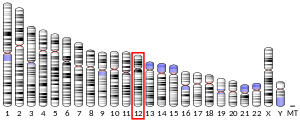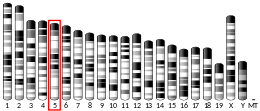ACAD10
Acyl-CoA dehydrogenase family, member 10 is a protein that in humans is encoded by the ACAD10 gene.[5]
| ACAD10 | |||||||||||||||||||||||||
|---|---|---|---|---|---|---|---|---|---|---|---|---|---|---|---|---|---|---|---|---|---|---|---|---|---|
| Identifiers | |||||||||||||||||||||||||
| Aliases | ACAD10, acyl-CoA dehydrogenase family member 10 | ||||||||||||||||||||||||
| External IDs | OMIM: 611181 MGI: 1919235 HomoloGene: 49825 GeneCards: ACAD10 | ||||||||||||||||||||||||
| |||||||||||||||||||||||||
| |||||||||||||||||||||||||
| |||||||||||||||||||||||||
| Orthologs | |||||||||||||||||||||||||
| Species | Human | Mouse | |||||||||||||||||||||||
| Entrez | |||||||||||||||||||||||||
| Ensembl | |||||||||||||||||||||||||
| UniProt | |||||||||||||||||||||||||
| RefSeq (mRNA) | |||||||||||||||||||||||||
| RefSeq (protein) | |||||||||||||||||||||||||
| Location (UCSC) | Chr 12: 111.69 – 111.76 Mb | Chr 5: 121.62 – 121.66 Mb | |||||||||||||||||||||||
| PubMed search | [3] | [4] | |||||||||||||||||||||||
| Wikidata | |||||||||||||||||||||||||
| |||||||||||||||||||||||||
Structure
This gene encodes a member of the acyl-CoA dehydrogenase family of enzymes (ACADs), which participate in the beta-oxidation of fatty acids in mitochondria. The encoded enzyme contains a hydrolase domain at the N-terminal portion, a serine/threonine protein kinase catalytic domain in the central region, and a conserved ACAD domain at the C-terminus. Several alternatively spliced transcript variants of this gene have been described, but the full-length nature of some of these variants has not been determined.[5]
Clinical significance
In Pima people, ACAD10 has been identified as a gene associated with type 2 diabetes, insulin resistance, and impaired lipid metabolism. Specifically, two single nucleotide polymorphisms, rs601663 and rs659964, have been significantly correlated with these symptoms in a large population of both the Pima people and American Indians.[6]
Interactions
Using affinity capture mass spectrometry, an interaction is inferred when a bait protein is affinity captured from cell extracts by either polyclonal antibody or epitope tag and the associated interaction partner is identified by mass spectrometric methods. Using this method, ACAD10 has been shown to interact with P2RY8, NDUFA10, NTRK3, SLC2A12, LPAR4, PTH1R, COLEC10, APP, MAS1, CD79A, BSG, and Ubiquitin C.[7]
References
- GRCh38: Ensembl release 89: ENSG00000111271 - Ensembl, May 2017
- GRCm38: Ensembl release 89: ENSMUSG00000029456 - Ensembl, May 2017
- "Human PubMed Reference:". National Center for Biotechnology Information, U.S. National Library of Medicine.
- "Mouse PubMed Reference:". National Center for Biotechnology Information, U.S. National Library of Medicine.
- "Entrez Gene: Acyl-CoA dehydrogenase family, member 10".
- Bian L, Hanson RL, Muller YL, Ma L, Kobes S, Knowler WC, Bogardus C, Baier LJ (Jul 2010). "Variants in ACAD10 are associated with type 2 diabetes, insulin resistance and lipid oxidation in Pima Indians". Diabetologia. 53 (7): 1349–53. doi:10.1007/s00125-010-1695-y. PMC 2947857. PMID 20390405.
- "ACAD10 Results Summary". BioGrid. TheTyerslab.com. Retrieved 18 May 2015.
External links
- Human ACAD10 genome location and ACAD10 gene details page in the UCSC Genome Browser.
Further reading
- Ye X, Ji C, Zhou C, Zeng L, Gu S, Ying K, Xie Y, Mao Y (Sep 2004). "Cloning and characterization of a human cDNA ACAD10 mapped to chromosome 12q24.1". Molecular Biology Reports. 31 (3): 191–5. doi:10.1023/b:mole.0000043622.57408.6b. PMID 15560374.
- Vega A, Salas A, Milne RL, Carracedo B, Ribas G, Ruibal A, de León AC, González-Hernández A, Benítez J, Carracedo A (Jan 2009). "Evaluating new candidate SNPs as low penetrance risk factors in sporadic breast cancer: a two-stage Spanish case-control study". Gynecologic Oncology. 112 (1): 210–4. doi:10.1016/j.ygyno.2008.09.012. PMID 18950845.
- He M, Pei Z, Mohsen AW, Watkins P, Murdoch G, Van Veldhoven PP, Ensenauer R, Vockley J (Apr 2011). "Identification and characterization of new long chain acyl-CoA dehydrogenases". Molecular Genetics and Metabolism. 102 (4): 418–29. doi:10.1016/j.ymgme.2010.12.005. PMC 3073726. PMID 21237683.
- Qayyum R, Snively BM, Ziv E, Nalls MA, Liu Y, Tang W, Yanek LR, Lange L, Evans MK, Ganesh S, Austin MA, Lettre G, Becker DM, Zonderman AB, Singleton AB, Harris TB, Mohler ER, Logsdon BA, Kooperberg C, Folsom AR, Wilson JG, Becker LC, Reiner AP (2012). "A meta-analysis and genome-wide association study of platelet count and mean platelet volume in African Americans". PLoS Genetics. 8 (3): e1002491. doi:10.1371/journal.pgen.1002491. PMC 3299192. PMID 22423221.
- Lee JY, Lee BS, Shin DJ, Woo Park K, Shin YA, Joong Kim K, Heo L, Young Lee J, Kyoung Kim Y, Jin Kim Y, Bum Hong C, Lee SH, Yoon D, Jung Ku H, Oh IY, Kim BJ, Lee J, Park SJ, Kim J, Kawk HK, Lee JE, Park HK, Lee JE, Nam HY, Park HY, Shin C, Yokota M, Asano H, Nakatochi M, Matsubara T, Kitajima H, Yamamoto K, Kim HL, Han BG, Cho MC, Jang Y, Kim HS, Euy Park J, Lee JY (Mar 2013). "A genome-wide association study of a coronary artery disease risk variant". Journal of Human Genetics. 58 (3): 120–6. doi:10.1038/jhg.2012.124. PMID 23364394.
- Bian L, Hanson RL, Muller YL, Ma L, Kobes S, Knowler WC, Bogardus C, Baier LJ (Jul 2010). "Variants in ACAD10 are associated with type 2 diabetes, insulin resistance and lipid oxidation in Pima Indians". Diabetologia. 53 (7): 1349–53. doi:10.1007/s00125-010-1695-y. PMC 2947857. PMID 20390405.
- Wu C, Hu Z, He Z, Jia W, Wang F, Zhou Y, Liu Z, Zhan Q, Liu Y, Yu D, Zhai K, Chang J, Qiao Y, Jin G, Liu Z, Shen Y, Guo C, Fu J, Miao X, Tan W, Shen H, Ke Y, Zeng Y, Wu T, Lin D (Jul 2011). "Genome-wide association study identifies three new susceptibility loci for esophageal squamous-cell carcinoma in Chinese populations". Nature Genetics. 43 (7): 679–84. doi:10.1038/ng.849. PMID 21642993.
This article incorporates text from the United States National Library of Medicine, which is in the public domain.



